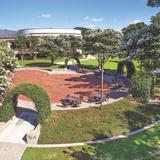- TSTC Waco is part of the Texas State Technical College System, a public coeducational institution of higher education offering courses of study in technical education leading to the award of Certificates and Associate of Applied Science degrees.
School Highlights
Texas State Technical College serves 13,181 students (48% of students are full-time).
The college's student-teacher ratio of 8:1 is lower than the state community college average of 23:1.
Minority enrollment is 68% of the student body (majority Hispanic), which is less than the state average of 74%.
Quick Facts (2025-26)
- Enrollment: 13,181 students
- In-state tuition: $3,342
- Out-state tuition: $7,200
- Acceptance Rate: 68%
- Student-teacher ratio: 8:1
- Minority enrollment: 68%
- Source: Integrated Postsecondary Education Data System (IPEDS)
Top Rankings
Texas State Technical College ranks among the top 20% of public schools in Texas for:
Category
Attribute
Community Size
School Overview
The teacher population of 1,562 teachers has stayed relatively flat over five years.
Texas State Technical College
(TX) Community College Avg.
Carnegie Classification
Associate's Colleges: High Career & Technical-High Traditional
Baccalaureate/Associate's Colleges: Associate's Dominant
Institution Level
At least 2 but less than 4 years
At least 2 but less than 4 years
Institution Control
Public
Public
Total Faculty
1,562 staff
262 staff
School Calendar
Student Body
The student population of Texas State Technical College has grown by 22% over five years.
The student-teacher ratio of 8:1 has increased from 7:1 over five years.
The Texas State Technical College diversity score of 0.59 is less than the state average of 0.70. The school's diversity has stayed relatively flat over five years.
Total Enrollment
13,181 students
4,931 students
Student-Teacher Ratio
8:1
23:1
# Full-Time Students
6,268 students
909 students
# Part-Time Students
6,913 students
4,022 students
# Enrollment Undergraduate
131 students
403 students
# Full-Time Undergraduate Students
6,268 students
890 students
# Full-Time Graduate Students
n/a
40 students
# Part-Time Undergraduate Students
6,913 students
4,166 students
# Part-Time Graduate Students
n/a
47 students
Total Dormitory Capacity
2,320 students
252 students
% Asian
1%
6%
% Hispanic
55%
46%
% Black
6%
13%
% White
32%
26%
% Two or more races
n/a
3%
% Non Resident races
n/a
2%
% Unknown races
6%
4%
Diversity Score
0.59
0.70
College Completion Rate (Students who graduate in less than 4 years)
37%
55%
College Completion Rate (Students who graduate in 4 years or more than 4 years)
n/a
34%
Average Graduate Earnings (10 Years)
$39,500
$34,600
Tuition and Acceptance Rate
The public in-state tuition of $3,342 is less than the state average of $3,764. The in-state tuition has declined by 45% over four years.
The public out-state tuition of $7,200 is more than the state average of $6,054. The out-state tuition has declined by 31% over four years.
In-State Tuition Fees
$3,342
$3,764
Out-State Tuition Fees
$7,200
$6,054
% Students Receiving Some Financial Aid
87%
84%
Median Debt for Graduates
$12,666
$9,584
Median Debt for Dropouts
$6,334
$5,250
Acceptance Rate
68%
84%
Source: 2023 (or latest year available) Integrated Postsecondary Education Data System (IPEDS) , School Administrators
School Notes
- Texas State Technical College (TSTC) was established in 1965 as the James Connally Technical Institute (JCTI) of Texas A&M University to meet the state's evolving workforce needs. This college was located in Central Texas at the former James Connally Air Force Base in Waco. In 1967, JCTI expanded to include a South Texas campus in Harlingen. In 1969, the colleges separated from Texas A&M University and became an independent state system, with the name Texas State Technical Institute (TSTI) and its own Board of Regents. Additional campuses were created in 1970 in Amarillo in the Panhandle of Texas and in Sweetwater in West Texas. As the demand for quality technical education continued to grow, extension centers were established in McAllen (1983), Abilene (1985), Breckenridge (1989), Brownwood (1991), and Marshall (1991). In 1991, TSTI was renamed Texas State Technical College (TSTC). In 1999, the extension center in Marshall became an independent college of the system. The college is nationally recognized for the number and quality of our technology graduates. TSTC Waco offers more than 100 associate's degree and hands-on instruction utilizing industry standard equipment that will prepare you for success in your career in agriculture; information technology and telecommunications; engineering and manufacturing; health and science; business, commerce and service; and transportation and aviation. TSTC Waco offers more than 100 technical associate's degree and certificate programs providing you with a world of technology at your fingertips. TSTC students enroll in courses that offer extensive hands-on experience in laboratories housing industry standard equipment. In technical courses, students spend almost 60 percent of their educational time in laboratories, learning by doing. Texas State Technical College Waco is accredited to award Associate of Applied Science degrees and Certificates of Completion by the Commission on Colleges of the Southern Association of Colleges and Schools.
Frequently Asked Questions
How much does Texas State Technical College cost?
Texas State Technical College's tuition is approximately $3,342 for In-State students and $7,200 for Out-State students.
What is the acceptance rate of Texas State Technical College?
The acceptance rate of Texas State Technical College is 68%, which is lower than the state average of 84%.
What is Texas State Technical College's ranking?
Texas State Technical College ranks among the top 20% of community college in Texas for: Largest student body.
Recent Articles

The Rise of Technical and Vocational Training in 2025
Explore the 2025 surge in technical and vocational training—enrollment, policy, costs, and why this path is gaining ground for students and parents.

Stackable Credentials: How Community Colleges Advance Careers
Discover how community colleges use stackable credentials to build career pathways, boost earnings, and enable lifelong learning in 2025.

High-Paying Jobs You Can Get with a Community College Degree
Discover top high-paying careers you can launch in 2025 with a community college (associate) degree and high-growth credentials in tech, healthcare and trades.










